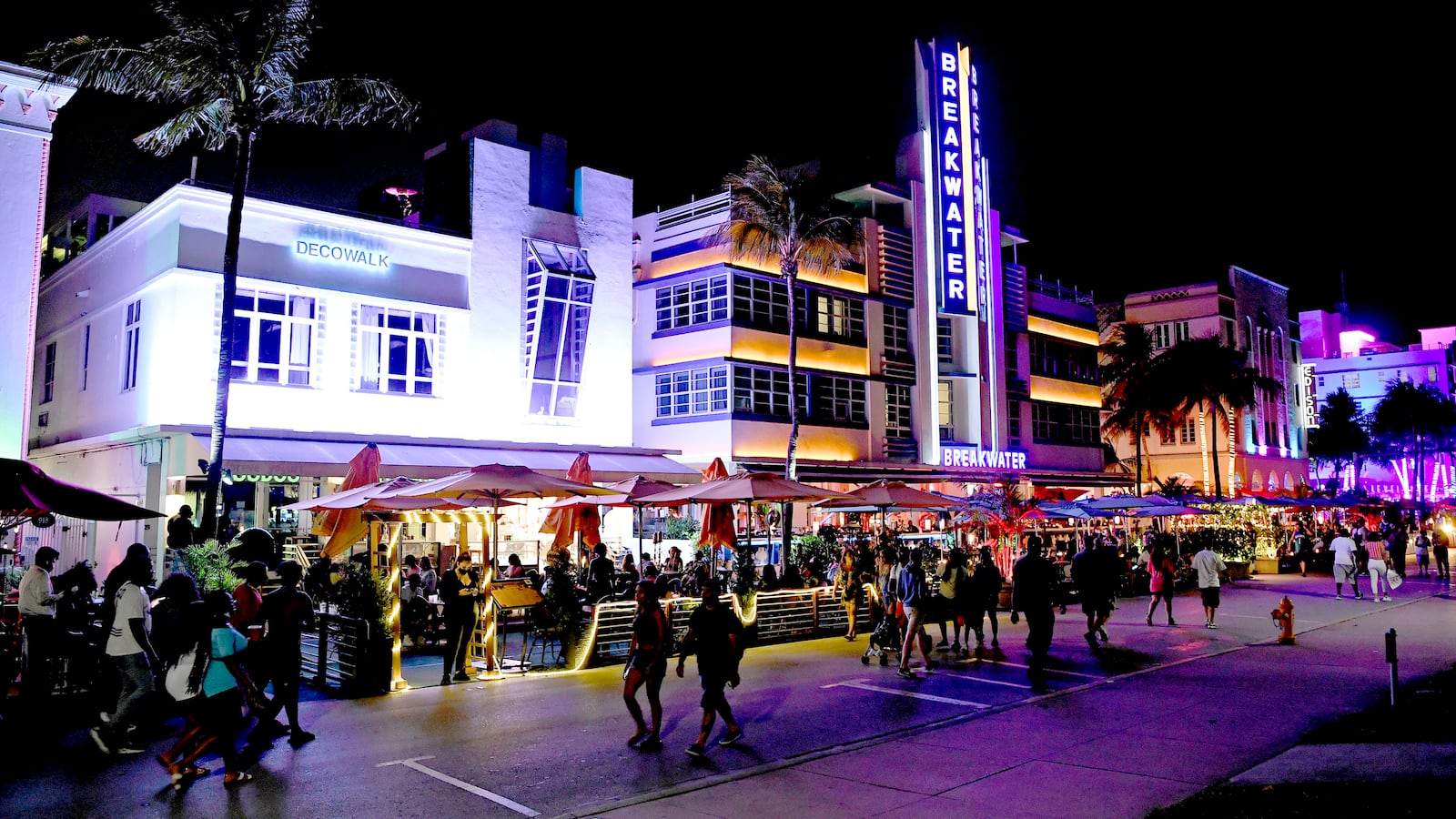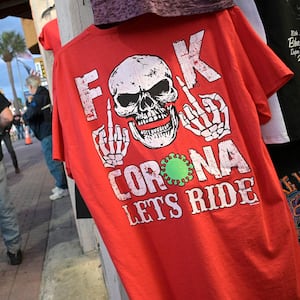MIAMI—A midnight curfew was no match for Juovani Dror.
On Friday night, the 27-year-old Israeli bon vivant and a crew of friends raged at a techno party in Coconut Grove, an affluent waterfront neighborhood in Miami. It’s a city where nearly 245,000 coronavirus cases have been recorded since the beginning of the pandemic, almost triple the number in Orlando, the city with the second-highest number of cases in Florida.
“It was a very good event: more than 1,000 people at a warehouse party,” Dror told The Daily Beast. “For the techno scene, it’s all warehouses now. And it’s a very good crowd made up of beautiful people and big money spenders.”
Late Saturday afternoon, Dror said, he recharged with drinks at Joia Beach Restaurant and Beach Club, a flossy outdoor venue adjacent to a megayacht marina on Miami’s Watson Island. From there, he hopped across the MacArthur Causeway for a late-night dinner with friends at Astra Miami, a rooftop eatery and lounge in the city’s trendy Wynwood neighborhood.
“We partied until 1:30 in the morning,” Dror said. “They usually close at midnight, but we were having so much fun. I had people standing on the chairs and we moved tables to have a bigger dance floor.”
The turn-up was just getting started, he added. “From there, we went to M3 Studios for a techno party called ‘Aria.’,” Dror said. “It was me and about 20 people. We stayed until about 5 a.m.”
Management at Joia Beach, Astra, and M3 Studios did not respond to requests for comment. But dozens of hashtags and geolocations for those and other Miami nightlife venues on Instagram, including posts by Dror, pointed to scenes of the juiced-up debauchery unfolding in the Magic City at the height of Spring Break.
For several days now, videos have depicted maskless partygoers dancing on top of tables after curfew at other popular restaurants such as Komodo Miami and Kiki’s on the River. (Neither establishment responded to requests for comment). Other clips for a Saturday night underground party in Miami Beach featuring New York City DJ Roger Sanchez showed ravers, many sans masks, dancing shoulder-to-shoulder. (Sanchez could not immediately be reached for comment, and Dror insisted the establishments he frequents enforce mask-wearing if people are not eating, drinking, or dancing.)
Interviews with nightlife denizens, promoters, and health experts suggest that thanks to Gov. Ron DeSantis, the city is far too wide open given the daily positivity rate has not fallen below 5 percent for consecutive weeks throughout the pandemic. Now, with a combination of Spring Break and a general sense from the federal government on down that the pandemic is in its final throes, the parties are getting even wilder.
The only problem? Pandemic mutations are, too.
The wilding isn’t confined to restaurants and warehouses hosting dance parties. On Friday night, the Miami Beach Police Department tweeted that officers on the streets and sidewalks were dealing with “very large crowds,” detaining people and “forced to use pepper balls” on civilians. Videos also showed partygoers twerking on a patrol car and a massive crowd dispersing when cops body slammed a man. 100 people were reportedly arrested in Miami Beach alone.
Even for a seasoned party pro like Dror, Miami’s party scene has ratcheted up several notches.
“It’s going crazy right now,” he said. “It’s definitely more intense. Some of it is Spring Break crowds, but a lot of people from all over the world are coming to Miami for a good time. You can go out on Thursday night and stay out until Monday morning without having to go home in between.”
For folks not from Florida, Dror’s perspective may seem as foreign as a virus that spread from one side of the Earth to the other. Except in Miami, for several months now, party-minded residents and visitors have been freed from the lockdown shackles that some states are just beginning to loosen. In September, DeSantis relaxed a majority of COVID-19 business restrictions, including those allowing cities and counties to enforce fines against people who refuse to wear masks in public.
Last week, he waived all fines against people and businesses that violated local curfews, indoor mask requirements, and other COVID-19-related ordinances. As a result, Miami-Dade stopped issuing citations this weekend, according to the Miami Herald, even as local officials have slammed DeSantis for hamstringing them. “We’re no longer doing it because the governor pardoned everything,” Detective Alvaro Zabaleta, spokesperson for the Miami-Dade Police Department, told the paper.
A spokesperson for DeSantis did not immediately respond to a request for comment for this story.
The freedom to party, pandemic fatigue, and the public perception the pandemic is nearing an end are combining to form a dangerous cocktail in Miami-Dade. Coronavirus-related hospitalizations and deaths have been tracking downward since the end of January following the holiday surge, according to infectious disease experts. But even as the 14-day daily positivity rate in Miami-Dade is currently at 6 percent, just north of the 5 percent benchmark used by some experts, the count still averaged nearly 1,200 new daily cases between March 1 and March 14.
And Florida currently leads the nation in the number of cases involving new variants, such as the B.1.1.7 strain known as the U.K. variant, which some experts believe to be deadlier.
“I understand people want the pandemic to be over, but it is not over,” Florida International University epidemiology Professor Dr. Mary Jo Trepka told The Daily Beast. “We are not even down to the number of daily cases that we had back in the fall. We need people to be careful to avoid increased transmissions.”
Engaging in the type of behavior of Dror and other partygoers will only prolong the pandemic unnecessarily, Trepka added. “We are trending in the right direction,” she said. “But we are not quite there yet. Those types of behaviors increase the risk for everybody. And for those people coming from other parts of the U.S. and the world, they risk bringing back these variants to their communities if they get exposed here in Miami.”
During his first presidential address last week, Joe Biden mandated all states make all Americans eligible for vaccines by May 1 and boldly claimed that people could look forward to possibly gathering in large groups for Independence Day. But in Miami, some young partygoers argue there’s no harm gathering now as long as they avoid family members, friends, and others who are at high risk from being hospitalized or dying from COVID-19, such as senior citizens 65 and over.
On Saturday night, shortly after 11 p.m., Adrian Colon, a 38-year-old real estate agent, joined three other friends for a late dinner at Komodo Miami. He told The Daily Beast that he and other friends caught COVID-19 at different times over the summer.
“I quarantined for two weeks,” Colon said. “A friend of mine recently got sick and he didn’t go out until he tested negative. And if you have elderly people in your family, then don’t be stupid and hang out with them after you go out partying.”
Still, Colon, who sported a mask while speaking to The Daily Beast outside the restaurant’s entrance, said enforcement measures in the city were a joke.
“You go into any place and people will wear their masks on for 10 seconds and take them off,” he said. “You will see 20, 30 people sitting at one table everywhere in Miami.”
Dror said he and his friends follow a similar game plan. “I know friends who don’t see their parents and their grandparents since this all started,” he said. “It looks a little bit irresponsible going to all these parties. But some people really need to dance in order to live. It’s my thing, I live for the people.”
Despite his carefree attitude, Dror insisted he’s not taken the coronavirus for granted. He’s gotten tested for COVID-19 a couple of times and he plans on getting vaccinated once he’s eligible, he noted. “I want people to feel comfortable being near me,” he said. “But I don’t think a lot of people look at Miami’s party scene in a bad way. It’s something very beautiful.”
Of more immediate concern to Dror than the pandemic: He gained two new followers on Instagram from Chile who hit him up about meeting in Miami and partying.
“I think a lot of people are saying, ‘I wish I could do that,’” he said. “Whoever is looking for a big party, they are coming to Miami.”



